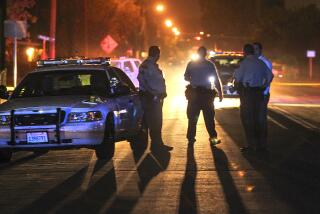THE RANDY KRAFT DECISION : ‘There’s a Void’ : Verdict Won’t End One Family’s Anguish
- Share via
Arvetta and Denver Sayre of Santa Ana know that no one will ever be tried for the murder of their teen-age son 10 years ago. But Arvetta Sayre took vacation this week to see Randy Steven Kraft receive a jury’s verdict. It’s the closest thing to justice they expect to get.
Fifteen-year-old Jeffre Sayre is one of 21 young men in Southern California whose deaths are linked to Kraft by prosecutors, but not included in his trial.
Deputy Dist. Atty. Bryan F. Brown charged Kraft with 16 murders in Orange County, adding eight more in the penalty phase of the trial. But they had accused him in court papers of 21 more.
For strategic reasons and to save court time, Brown had to leave out the others.
The Sayres understood.
“Dan DiSanto, the D.A. investigator, came to us right after the guilt verdict and told us our son’s case would not be brought up in the penalty phase,” Arvetta Sayre said. “He wanted to make sure we understood why. We really appreciated that.”
The Sayre death was among several that occurred in Orange County and legally could have been used in the guilt phase. But using it would have meant delaying the trial with another preliminary hearing.
The Sayre case had two major problems. One was that the only solid evidence linking Kraft to the teen-ager’s death was a notation on a list found in Kraft’s car. The other reason: Jeffre Sayre’s body has never been found.
Without a body, prosecutors could not show that he had been killed in the same way as Kraft’s other victims. There was no death scene where investigators could gather fingerprints or evidence.
“The Sayre case was just too skinny,” said one law enforcement official. “But you can be sure he was killed by Randy Kraft.”
The reason law enforcement officials are so sure of that is the notation “Westminster Date” on what they believe is a death list. Sayre had just left his date’s house in Westminster when he disappeared. He was last seen near a bus stop at Bolsa Avenue and Valley View Street.
Arvetta Sayre did not realize he was missing until the next morning.
“The boys (Jeffre and her other son, Kevin) always kept the doors to their rooms closed when they were home, and when I got up, Jeff’s door was open. I thought maybe he had got up early to help his brother on his paper route.”
By mother’s intuition, she said, she knew after the first day he was dead.
“He would never leave home without calling,” said Denver Sayre, Jeff’s stepfather.
At first, law enforcement officials thought Sayre might have been killed by William Bonin, the Freeway Killer, who was not in prison then. But Bonin confessed to all his murders, officials believe, and Sayre wasn’t among them.
The Sayres were told by Sheriff’s Department Sgt. James A. Sidebotham at Kraft’s preliminary hearing in 1983 about the list in Kraft’s car.
“He said, ‘Arvetta, we firmly believe that Westminster Date represents your son,’ ” she said. “And we believe it too.”
But still, she said, it’s not the same as having Kraft on trial for their son’s death.
“There’s a void,” she said. “We feel almost like outsiders, though certainly the other victims’ families have not made us feel that way.”
Sayre said she had hoped for a death verdict.
“It’s not revenge,” she said. “It’s just our only guarantee he can never do this to anyone else’s son.”
While the Kraft trial will help give the Sayres the finality to their son’s death that they believe is needed, a few things are missing.
“We never got a chance to have a memorial service, like most people do when a loved one dies,” she said.
Also, they have some hope that, if Kraft did kill their son, he may someday tell them where the body is.
“I don’t think he will ever talk about it,” she said, “but we would hope he could somehow find it in his heart to tell us.”
More to Read
Sign up for Essential California
The most important California stories and recommendations in your inbox every morning.
You may occasionally receive promotional content from the Los Angeles Times.













